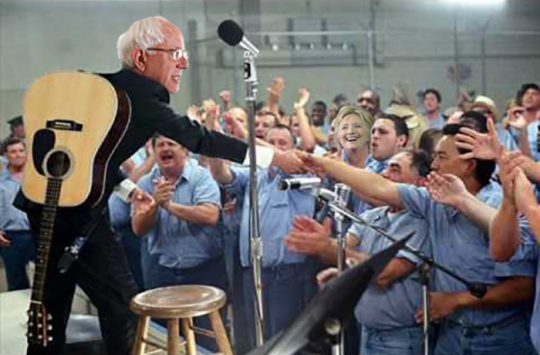Sen. Bernie Sanders (I., Vt.), the frontrunner to win the Democratic nomination in 2020, is not backing down from his support for extending voting rights to incarcerated felons, including terrorists and mass-murders such as convicted Boston Marathon bomber Dzhokhar Tsarnaev.
"What our campaign is about, and what I believe, is creating a vibrant democracy," Sanders said during a CNN town hall event on Monday. "If somebody commits a serious crime, sexual assault, murder, they're going to be punished. They may be in jail for 10 years, 20 years, 50 years, their whole lives. That's what happens when you commit a serious crime, but I think the right to vote is inherent to our democracy. Yes, even for terrible people."
Sanders' absolutist position on extending voting rights to "terrible people" is unlikely to be embraced by his challengers in the Democratic primary. Sen. Kamala Harris (D., Calif), for example, had initially expressed a willingness to "have that conversation" about extending the vote to terrorists and murderers like Tsarnaev, but was forced to clarify her position and assert that violent prisoners "should be deprived of their rights" to participate in elections. This sort of waffling has become something of a pattern for Harris.
South Bend Mayor Pete Buttigieg, on the other hand, was far more decisive in his rejection of Sanders' proposal.
Question: "Should people convicted of sexual assault, the Boston Marathon bomber, should they be able to vote?
Mayor Pete Buttigieg: "While incarcerated? No. I don't think so." https://t.co/MYKa164viQ pic.twitter.com/SehyOo6k3Q
— The Hill (@thehill) April 23, 2019
Sanders's position on the issue of prisoner voting rights is presumably a welcome development for the nascent campaign among Democratic Party activists to forestall his nomination. It probably won't help Sanders win over primary voters who are more moderate than the dominant social media presence of liberal activists would suggest, according to a New York Times analysis.
However, Sanders' view appears to have found a foothold in the insurgent celebrity wing that has been largely successful in its campaign to influence the direction of the party. Rep. Alexandria Ocasio-Cortez's (D., N.Y.) chief of staff, for example, logged on to Twitter to voice support for Sanders's position on prisoners who cannot vote because of "unjust laws" such as, um, the proscription against murder?
What's the reason NOT to let incarcerated people vote? Shouldn't the people most affected by unjust laws have some say in electing people to change them?
— Saikat Chakrabarti (@saikatc) April 24, 2019
Chakrabarti even went so far as to imply that incarcerated felons should not be stripped of their Second Amendment right to keep and bear arms.
The Constitution names the right to vote five times. It talks about not infringing on the right, just like the right to bear arms: "A well-regulated Militia, being necessary to the security of a free State, the right of the people to keep and bear Arms, shall not be infringed."
— Saikat Chakrabarti (@saikatc) April 24, 2019
It's an interesting proposition, one that could ultimately results in "Supermax bachelors" overtaking "Soccer moms" and "Nascar dads" or even "Cosplay Latinx" as the crucial swing-vote demographic in U.S. presidential elections. Giving prisoners the right to vote could make a significant impact in red states such as Alabama (41,000 inmates), Arizona (55,000), Arkansas (24,000), Georgia (91,000), Kentucky (35,000), Louisiana (45,000), Mississippi (29,000), Oklahoma (39,000), and Texas (219,000), where the incarcerated rate exceeds 1,000 inmates per 100,000 adults, significantly higher than the national average of 850.
In fact, the prison populations of Michigan (57,000), Pennsylvania (82,000), and Wisconsin (35,000) are significantly greater than Donald Trump's 2016 margin of victory in those states (Michigan: 10,704, Pennsylvania: 44,292, Wisconsin: 22,748). This is also true of Florida, whose prison population (150,000) could more than make up for Trump's margin of victory (112,911).
Perhaps when Hillary Clinton runs again in 2028, her failure to visit ADX Florence, the supermax federal penitentiary in Colorado where Tsarnaev is currently serving on death row, will prove a crucial blunder in her historical third national-election defeat at the hands of GOP challenger Hope Hicks. Heck, maybe by that time the laws will have changed to allow Hillary to run for president from prison herself.
